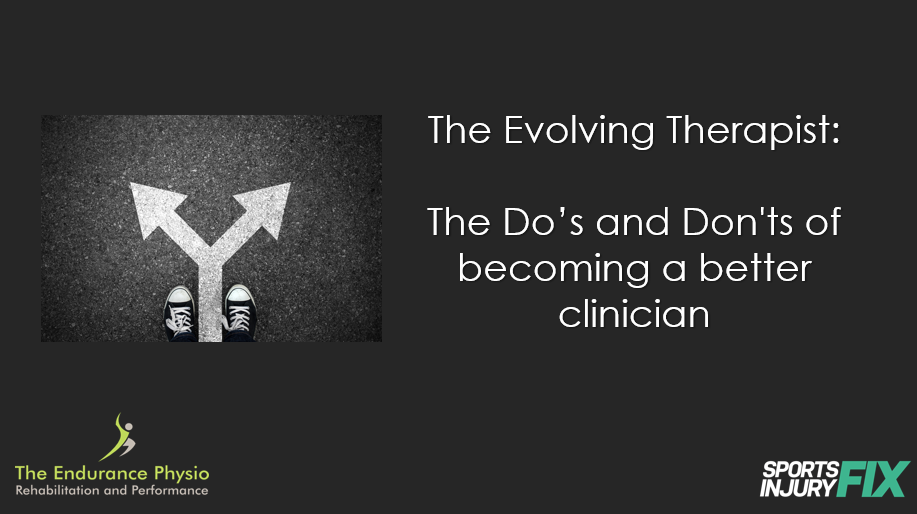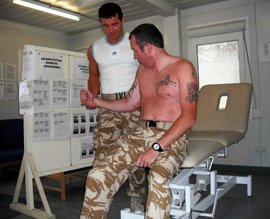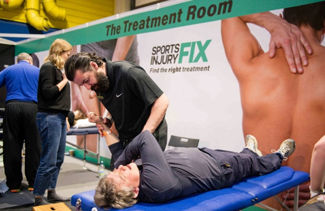The Do's and Don'ts of becoming a better Therapist
By Mike James | 18th December 2018 | General
SportsinjuryFix.com Director Mike James, a Specialist Musculoskeletal Physiotherapist was recently asked to speak at the prestigious Therapy Expo in Birmingham NEC. Mike used his varied and comprehensive experience, coupled with his non-traditional career path to give his thoughts and reflections on the do’s and don’ts of becoming a better therapist. He’s taken the time to turn the presentation into a blog to share with our members.  I was very honoured to be asked by The Sports Therapy Association (STA) to speak at their Therapy Update Conference as part of the prestigious Therapy Expo 2018. It always intrigues me how great things can grow out of simple conversations, and this is certainly one of those situations. It all began on a snowy January day, coincidentally also at the NEC in Birmingham in January 2018. I was part of a multidisciplinary team of SportsInjuryFix.com therapists offering advice and treatment to delegates at the National Running Show, a fantastic celebration of running, with a jam-packed speaker programme and exhibition stands from all the industry leaders.https://www.sportsinjuryfix.com/join
I was very honoured to be asked by The Sports Therapy Association (STA) to speak at their Therapy Update Conference as part of the prestigious Therapy Expo 2018. It always intrigues me how great things can grow out of simple conversations, and this is certainly one of those situations. It all began on a snowy January day, coincidentally also at the NEC in Birmingham in January 2018. I was part of a multidisciplinary team of SportsInjuryFix.com therapists offering advice and treatment to delegates at the National Running Show, a fantastic celebration of running, with a jam-packed speaker programme and exhibition stands from all the industry leaders.https://www.sportsinjuryfix.com/join
At the end of a ridiculously busy first day, we were all discussing anything and everything to do with therapy, and as you would expect when a diverse group of therapists including Podiatrists, Sports Therapists, Massage Therapists, Osteopaths and a Physio get together, the conversation moved onto the subject of the pros and cons of each profession, and this typically led to the ongoing debate of who is the best?.
I casually announced that I believe there are only two types of therapists, simply put – good therapists and bad therapists. This became a topic of conversation that continued over the remainder of the weekend and I followed it up with a Social Media video expanding on my thoughts. 40K+ views later and I was invited by the fantastic team at the STA to formalise my thoughts into a 30-minute presentation.
So where does my point of view originate from, well, simply put, I have been both privileged and fortunate enough to have a diverse and varied career that includes multidisciplinary and stand-alone work from the far-flung corners of the world whilst serving in the Military, to professional sport, the NHS including GP practices, private and public occupational health and in the private sector. This has allowed me exposure to many therapists from many backgrounds and made me realise that if everyone was to wear a plain, professionally non-identifiable uniform, then regardless of training or specialisation, you would notice that the good ones all possess and display common traits, as do the not so good ones!

I am a firm believer that a good therapist will always possess the following:
· A slick, well groomed, natural ability to build rapport and therapeutic alliance.
· A highly developed clinically reasoned thought process.
· Will be evidence based but with an exceptional level of practical application.
· Will be rigid in their beliefs but remain readily adaptable to each individual.
· Will be knowledge hungry and passionate about their profession.
Developing these traits occurs as a result of time and experience, however the good therapist will have invested heavily in a number of areas in order to feed that development, these areas include:
· Investment in time – as Malcolm Gladwell and others have eluded to, the mystical 10,000 hours is often purported to be required to achieve excellence in performance, a good therapist will have put in the hours in many varied facets from reading, learning, clinical practise to name but a few.
· Investment in the person – A good therapist will be working with the person as a whole, their beliefs, values, thoughts and concerns as well as their physical. They will treat the person, not just the body part.
· Investment in reflection - the good therapist will constantly reflect on their knowledge, performance and delivery. This can be quick and simple or more formal, but it facilitates growth and evolution.
· Investment of passion - this may seem a little left field. I don’t doubt the majority of therapists possess passion, but the good therapist will radiate passion, it will be their driver to develop, to give the same time, effort and commitment to the last patient of the day as they did the first. Every fire needs fuel, and the good therapist will feed the fire, and often their passion is infectious and spreads to colleagues, peers and patients alike.
So now we have identified some of the traits and qualities that a good therapist possesses, we need to try to identify ways of helping a therapist evolve to possess these and become a better clinician. But who are we pitching this to? The student? the newly qualified graduate? the 5-10-year qualified therapist potentially at a career crossroads? Or even the possibly long qualified disillusioned therapist? Well I guess it is all of those in reality, we should always be looking to evolve and improve regardless of career stage and position.
But I thought the best pitch for this blog would be to imagine I was a childhood hero of mine, the famous Marty McFly of the 1980’s cult movie franchise “Back to the future”. What if I had the iconic DeLorean and could travel back in time 20 years, find a much thinner, youthful and naïve Mike James who was just about to embark on a career in exercise, rehabilitation and ultimately Physiotherapy, and offer advice based on what I know now, that I wouldn’t have known then to enable him to have a blueprint, or a road map of sorts to help him become a better therapist. What if I could simply hand him a list of the Do’s and Don’ts of becoming a good therapist……….

Do…. The basics well.
Many therapists often get too focussed on learning advanced treatment techniques, gaining qualifications and collecting post nominals. These can often be useful in developing your ability, however, it is about timing. There is a time and place to add these things (although many good therapists do not necessarily possess or chase these things), but if done too soon or at an inappropriate time then this often comes at a cost: neglecting the fundamentals. Aim to become an expert in the fundamentals of subjective assessment, clinical reasoning, and many more essential components of skill development and proficient practise before chasing the “advanced” things.
Do…. Think critically and question everything.
Analyse and consider the positives and negatives that you see, read or listen to. Keep your intentions honest, remain open minded but inquisitive and you probably won’t go far wrong. This can be done overtly or covertly; a varied approach will probably be a better tactic – nobody likes the therapist who constantly critiques publicly unless it is done in a productive manner.
Do…. Be aware of your biases and respect them.
For many years it was deemed a negative to have a bias, we were encouraged to not have a bias and made to feel like it was a real negative thing to possess them. But in reality, we are humans, and naturally have many biases in our makeup from the type of car you like, to favourite foods, and even the people you associate yourself with. Understand that it’s ok to have biases, they are not evil!
But it does mean you need to confirm them, but also challenge them. Aim to follow, meet, discuss things with those who hold counter opinions and arguments to yourself. Social Media can be a minefield – but it can also be exceptionally helpful and allow unprecedented access to others.
Do…. Be YOU.
It can be hard to establish and find an identity. It’s ok to fake it until you make it in the short term, but long-term imitation of others (regardless of their skill or ability) is not being true to yourself. Be natural, be yourself and find your own unique pitch, some will find this easier than others, but it will be worth it in the long run and isn’t something that can be forced, let it happen naturally and don’t worry if you re-invent yourself numerous times before settling in your own skin.
Do…. Make a plan.
It is important to have an end goal – write this somewhere in pen. Everything else should be stepping stones to getting there – write these in pencil. It doesn’t matter if some steps go sideways, jump two stones forward or even occasionally go backwards. It is even ok to stand still for some time until you are ready to move forward again. But the final goal always remains in pen. Don’t worry if the plan isn’t typical. Not everyone’s career will be on a similar trajectory. You may know exactly what you want and need to go for it. Don’t worry if the plan isn’t obvious. Sometimes we find out what we really want to do by finding out what we really don’t want to do. Follow your gut. Sometimes something just feels right, go for it and see where it leads.
Do…. Keep it simple.
Too many therapists want to sound clever and important and this confuses the patient. There seems to be a quest to prove ourselves, maybe this is due to the medical hierarchical system, who knows? Being an effective therapist isn’t about proving your knowledge or competence, it’s about demonstrating and using it simplistically. As Einstein famously said, “if you can’t explain it simply, then you don’t understand it well enough”. He also stated, “genius is making complex ideas simple, not simple ideas complex”.
Do…. Develop your non-clinical skills.
Personal, emotional and communication skills are the real secrets to success. There is a case to be made that these are in fact more important than many technical or clinical skills. There are few, if any courses to teach empathy, compassion and understanding, yet these factors often separate the exceptional therapists from the rest.
Do…. Learn, learn learn! – Constantly!.
Never aim to be the most knowledgeable person in the room! Relearn, relearn, relearn! - relearning and revising the basics and your previous “expertise” is crucial. Develop a “what I know and do now isn’t what I did 5 years ago and won’t be what I do in 5 years” attitude. Make everyday a school day and evolution will be much easier.
Do…. Break down inter professional barriers.
There are only good or bad therapists! – but we all have unique backgrounds and journeys that got us here. Regardless of being a Chiropractor, Osteopath, Sports Therapist, Sports Rehabilitator or any other specialisation, diversity = growth - MDT working is the future and it needs to be embraced.
You will find many more similarities than differences between good therapists at the end of the day.
Do…. Be assertive.
Challenge the system, but with professionalism and respect. Don’t be subversive to the medical hierarchy - it is often outdated and inefficient. But pick your battles wisely and make sure you know your stuff! You get one shot at credibility, don’t waste it.
Do…. Grab every opportunity.
There will never be a perfect time, and you will never, ever be perfectly ready for the opportunity that arises. Trust yourself and grow into any role or job. A good team will always support you. If you are an independent therapist, build a local community of peers you can trust and help each other.
Now, although we have tried to focus on the positives thus far, naturally there are negatives that can limit development and we should try to avoid these but let’s try to highlight them in a more positive light.
Don’t……. Sell your Soul.
Making money should never be more important than helping people. If you offer genuine advice, honest care and realistic treatments, people will recommend you, people will come back. Don’t pick a craze, gimmick or fad for financial gain. They never last and these days get found out quickly!
Don’t…. Rush.
It takes time, energy and effort to progress. You can gain experience, skill and reputation quickly, but there are no short cuts or cheats. Like any good apprenticeship it comes down to time served. However, you can accelerate it. You will see therapists who have evolved to display 10 years’ worth of skill in one years’ worth of experience, and you will see vice versa, but play the long game, it’s the only way and a sensible approach.
Don’t ……. Guru Worship.
Thankfully the days of being trained in specific therapists’ doctrines and treatments appear long gone. Seek role models, seek many roles models, and seek as many diverse role models and mentors as you can. Each will have something to replicate, each will have something to ignore.
Analyse, reflect and integrate the things you find useful into shaping you as a unique therapist.
Don’t……. Think you will fix everyone.
This is so important. So many factors determine whether you will work well with someone, and many are outside your control and influence. Personality, life situations, beliefs, cultures etc all determine the outcome. Sometimes you just won’t work well together – be polite, be professional, pass them on to someone else and move on.
Don’t……. Be afraid to say you don’t know.
This earns respect from colleagues and patients. Be confidently unconfident. Its ok to not know something, if you express confidence and awareness of this, coupled with the passion to develop this learning then you will be fine. Keep notes of things you need to know more about and dedicate some time later to improve.
And finally …
Don’t………Take this as gospel.
I am just a therapist like you. I still don’t have all the answers. I make mistakes every day, and I continue to learn daily and reflect daily. I will continue to do this until I hang up my TheraBand! Every therapist can write this same list, some may be similar, and some will be wildly different, that’s why it’s important to seek many opinions and develop your own thoughts and beliefs.
You are entering a therapeutic world that can be confusing, annoying and frustrating. Today’s technology will enable you to have constant information at your fingertips –you won’t be able to sift through it all and make sense of everything.
However, it has never been a more exciting time to be a therapist. Many more diverse opportunities exist today to learn, develop and evolve as a therapist. More and more people are proving that you don’t need to follow old, potentially outdated career pathways, and/or guru worship in particular treatment methods per se to progress. Question everything and apply clinical reasoning always – there are many correct paths to reach your destination. Be confidently unconfident.
Have fun – it is a fantastic privilege to be able to help someone in pain or help them achieve their potential.
Thanks for taking the time to read this blog (its a bit of a long one!), hopefully if you are a practising therapist, regardless of age, skill or experience you have realised that many of these points still apply to us all each and every day in the quest to become a better therapist.https://www.sportsinjuryfix.com/join
